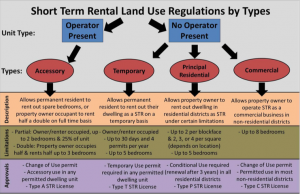Important Keys to Take from This Article:
- Short-Term Rentals (STRs) are here to stay, it is now just a matter of where this market fits in the overall real estate economy
- In regards to the legality of short-term rentals, it is important to take a market-by-market approach. In many places this type of rental is legal, while in others it is either prevented or contains extreme restrictions.
- Professional real estate agents should pay close attention to the short-term rental trend and make sure to monitor any regulatory changes
- This is the first in a series of articles about Short-Term Rentals
When asked about the success of his company, Airbnb co-founder Brian Chesky likes to say that “it was the worst idea that ever worked.” There is no disputing the success of Airbnb as the newly dubbed “sharing economy” is absolutely booming. Consider not only the impact of a company like Airbnb in real estate but also Uber in transportation and sites like Kickstarter for raising money. From its humble beginnings which involved literally renting out a bedroom in their San Francisco apartment and placing guests on air mattresses, Airbnb has exploded into a juggernaut in the online rental ecosystem.
Today Airbnb is a $25.5 billion business. There are over 1.5 million properties listed on the platform in 190 countries. By collecting a small fee on rentals booked through the platform, Airbnb has made it basically as easy as a click of a button to get a rental property in front of millions. The impact is real, and as real estate professionals, we need to pay attention and stay ahead of the curve.
Is Airbnb the symptom or the disease?

Asking whether or not Airbnb is the disease of the short-term rental explosion is sort of like asking whether Google is the reason we use search engines online. Of course, that is ridiculous! There were several search engines around before Google came around (Yahoo anyone?), but Google became the dominant force in the space that we all know today. Therefore, rather than only discuss Airbnb (the market leader) let’s take a brief look at the short term rental economy as a whole.
In many metro areas, property investors are choosing to convert traditional income properties into short-term rental only propositions. Take for instance the McMillan Court in Nashville, a modest 16-unit apartment complex which recently decided to go all in on the short term rental market. Rather than renting each of the 16 units under traditional residential lease terms, the only way the units can be rented now is through sites like VRBO or the aforementioned Airbnb. This is just one of over 3000 units in that particular market which have chosen to abandon the traditional lease model and go straight short term rental in recent months.
Then there is my home market of New Orleans. Actually, New Orleans finds itself as one of the real estate markets at the epicenter of the short-term rental conundrum. Only recently has the New Orleans City Council even voted on a proposal to establish a permitting and regulatory process for short term rental housing operating within the city. Despite the strong opposition to these short term rentals in New Orleans, the City Council simply could not ignore the economics.
According to a recent economic impact study, Airbnb rentals alone accounted for a staggering $169,017,209 money flow into the city. The economic impact not only considers how much rental income the landlords are making but also the effect Airbnb rentals have on local businesses such as restaurants and shopping. In addition, it has been estimated that Airbnb alone accounted for over 4,000 jobs in New Orleans!
According to a recent economic impact study, Airbnb rentals alone accounted for a staggering $169,017,209 money flow into the city and over 4,000 jobs
Are Short-Term Rentals Even Legal?
Oh, baby! Now we get into more complicated parts of understanding short term rentals. The answer is simple: it depends on your market. There are some municipalities where short term rentals are perfectly legal, assuming the landlord goes through the proper permitting process. In addition, legal markets usually have other regulations which must be followed. Alternatively, there are some cities which are still bucking the trend and refusing to technically allow short-term rentals in their marketplaces. And then others are allowing the practice, with serious or extremely limiting conditions in place.
Case Study: New York City
As an example, in New York City residential property located in a multi-residential dwelling property, such as an apartment building, must be used for “permanent resident purposes.” As defined this means it must be occupied by the same person or family for over 30 consecutive days. Therefore, you would have to have a license as a hotel or bed & breakfast to legally rent out your unit for less than 30 days in New York City. However, there is an important exception: It’s not illegal to rent out a room in New York City if you also occupy the property at the same time and all parts of the dwelling are available to the paying guest. So the “sharing” part of the sharing economy is still alive and well, it is simply the non-resident investor looking to employ short-term rentals who may find legal trouble in a market like New York City.
Case Study: Nashville
In other markets such as the aforementioned Nashville, there is a special ordinance which regulates short-term rental properties. In that case, property owners will generally need to obtain a proper permit and comply with the appropriate regulations. Therefore the short term rental practice is legal, but property owners must maintain a certain level of compliance. There are many other markets which have similar structures in place, and actually, Airbnb has published an excellent guide for their potential hosts on their website.
Some Markets are Still Struggling with the Regulation Issue
And then, there are complicated markets like my beloved New Orleans. Remember the economic impact study I cited about the amazing amount of money flowing into New Orleans as a result of Airbnb? What is truly amazing about this impact is that technically many of the properties cited in the study would probably viol ate, at least in part, city ordinances in New Orleans.
ate, at least in part, city ordinances in New Orleans.
However, there is a proposal on the table to take on short-term rentals market as a legal and regulated industry in the within the city. But, it’s complicated. The proposed regulations break down short-term rentals into three categories and contain different rules depending on the type of rental. Of particular concern in New Orleans’ new ordinance proposal would be “accessory” rentals – which are owner-occupied, and “temporary” rentals – which are not occupied by the owner at all. See the chart to the right for information on the current city proposal.
Are Short-Term Rentals Helping or Hurting Real Estate Professionals?
If you’ve ever read anything from me or seen me speak in person, you know that I have strong convictions when it comes to listening to the consumer. In other words, I think any industry harms itself by ignoring the wants of the consumer or trying to keep them out. Just look at the impact of Uber on the Taxi industry, where the consumer simply wanted a faster and more tech-savvy option to get around. The more the taxi industry fought against the ride-sharing service, the more the consumer pushed back. In my opinion, the same will likely happen in this case.
As a real estate professional myself, I can already tell you that I have an increasing number of calls from potential investor clients mentioning Airbnb as one of their primary reasons for looking to purchase. It would make no sense for me not to stay right on top of the trend and make sure I understand the market as a professional so that I can properly advise my clients. Certainly, if you are a real estate professional who works with investors, you know that pricing is improving in many markets and some of this value can be attributed to an investor’s willingness to buy knowing they can recoup their investment by integrating short-term rental services like Airbnb.
Then, there is the property management aspect. If you are a licensed property manager, I can see plenty of opportunity in this marketplace where investors will be turning over the professional management of their Airbnb properties to appropriately licensed professionals. In some areas where short term rentals are legal and investors have booming portfolios, turning to a more traditional management structure of these properties by real estate professionals seems likely.
Where many people would be concerned, I see tremendous opportunity. However, this trend is worth watching closely. My suggestion is to stay right on top of it in your local market and be the expert.
